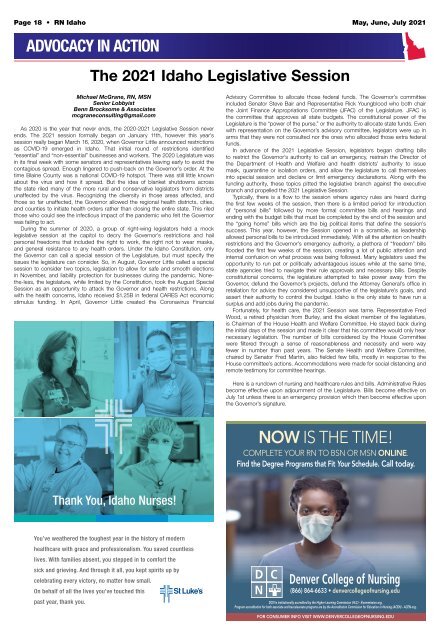RN Idaho - May 2021
Create successful ePaper yourself
Turn your PDF publications into a flip-book with our unique Google optimized e-Paper software.
Page 18 • <strong>RN</strong> <strong>Idaho</strong> <strong>May</strong>, June, July <strong>2021</strong><br />
ADVOCACY IN ACTION<br />
The <strong>2021</strong> <strong>Idaho</strong> Legislative Session<br />
Michael McGrane, <strong>RN</strong>, MSN<br />
Senior Lobbyist<br />
Benn Brocksome & Associates<br />
mcgraneconsulting@gmail.com<br />
As 2020 is the year that never ends, the 2020-<strong>2021</strong> Legislative Session never<br />
ends. The <strong>2021</strong> session formally began on January 11th, however this year’s<br />
session really began March 16, 2020, when Governor Little announced restrictions<br />
as COVID-19 emerged in <strong>Idaho</strong>. That initial round of restrictions identified<br />
“essential” and “non-essential” businesses and workers. The 2020 Legislature was<br />
in its final week with some senators and representatives leaving early to avoid the<br />
contagious spread. Enough lingered to push-back on the Governor’s order. At the<br />
time Blaine County was a national COVID-19 hotspot. There was still little known<br />
about the virus and how it spread. But the idea of blanket shutdowns across<br />
the state riled many of the more rural and conservative legislators from districts<br />
unaffected by the virus. Recognizing the diversity in those areas affected, and<br />
those so far unaffected, the Governor allowed the regional health districts, cities,<br />
and counties to initiate health orders rather than closing the entire state. This riled<br />
those who could see the infectious impact of the pandemic who felt the Governor<br />
was failing to act.<br />
During the summer of 2020, a group of right-wing legislators held a mock<br />
legislative session at the capitol to decry the Governor’s restrictions and hail<br />
personal freedoms that included the right to work, the right not to wear masks,<br />
and general resistance to any health orders. Under the <strong>Idaho</strong> Constitution, only<br />
the Governor can call a special session of the Legislature, but must specify the<br />
issues the legislature can consider. So, in August, Governor Little called a special<br />
session to consider two topics, legislation to allow for safe and smooth elections<br />
in November, and liability protection for businesses during the pandemic. Nonethe-less,<br />
the legislature, while limited by the Constitution, took the August Special<br />
Session as an opportunity to attack the Governor and health restrictions. Along<br />
with the health concerns, <strong>Idaho</strong> received $1.25B in federal CARES Act economic<br />
stimulus funding. In April, Governor Little created the Coronavirus Financial<br />
Advisory Committee to allocate those federal funds. The Governor’s committee<br />
included Senator Steve Bair and Representative Rick Youngblood who both chair<br />
the Joint Finance Appropriations Committee (JFAC) of the Legislature. JFAC is<br />
the committee that approves all state budgets. The constitutional power of the<br />
Legislature is the “power of the purse,” or the authority to allocate state funds. Even<br />
with representation on the Governor’s advisory committee, legislators were up in<br />
arms that they were not consulted nor the ones who allocated those extra federal<br />
funds.<br />
In advance of the <strong>2021</strong> Legislative Session, legislators began drafting bills<br />
to restrict the Governor’s authority to call an emergency, restrain the Director of<br />
the Department of Health and Welfare and health districts’ authority to issue<br />
mask, quarantine or isolation orders, and allow the legislature to call themselves<br />
into special session and declare or limit emergency declarations. Along with the<br />
funding authority, these topics pitted the legislative branch against the executive<br />
branch and propelled the <strong>2021</strong> Legislative Session.<br />
Typically, there is a flow to the session where agency rules are heard during<br />
the first few weeks of the session, then there is a limited period for introduction<br />
of “personal bills” followed by more formal committee bills and hearings and<br />
ending with the budget bills that must be completed by the end of the session and<br />
the “going home” bills which are the big political items that define the session’s<br />
success. This year, however, the Session opened in a scramble, as leadership<br />
allowed personal bills to be introduced immediately. With all the attention on health<br />
restrictions and the Governor’s emergency authority, a plethora of “freedom” bills<br />
flooded the first few weeks of the session, creating a lot of public attention and<br />
internal confusion on what process was being followed. Many legislators used the<br />
opportunity to run pet or politically advantageous issues while at the same time,<br />
state agencies tried to navigate their rule approvals and necessary bills. Despite<br />
constitutional concerns, the legislature attempted to take power away from the<br />
Governor, defund the Governor’s projects, defund the Attorney General’s office in<br />
retaliation for advice they considered unsupportive of the legislature’s goals, and<br />
assert their authority to control the budget. <strong>Idaho</strong> is the only state to have run a<br />
surplus and add jobs during the pandemic.<br />
Fortunately, for health care, the <strong>2021</strong> Session was tame. Representative Fred<br />
Wood, a retired physician from Burley, and the eldest member of the legislature,<br />
is Chairman of the House Health and Welfare Committee. He stayed back during<br />
the initial days of the session and made it clear that his committee would only hear<br />
necessary legislation. The number of bills considered by the House Committee<br />
were filtered through a sense of reasonableness and necessity and were way<br />
fewer in number than past years. The Senate Health and Welfare Committee,<br />
chaired by Senator Fred Martin, also fielded few bills, mostly in response to the<br />
House committee’s actions. Accommodations were made for social distancing and<br />
remote testimony for committee hearings.<br />
Here is a rundown of nursing and healthcare rules and bills. Administrative Rules<br />
become effective upon adjournment of the Legislature. Bills become effective on<br />
July 1st unless there is an emergency provision which then become effective upon<br />
the Governor’s signature.

















